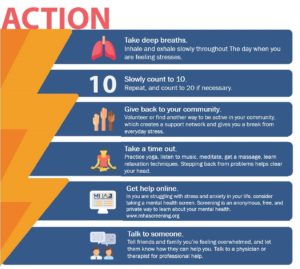We are human, and thinking ahead is natural. But when thinking ahead spirals away from creating motivation and becomes excessive, it can significantly interfere with our daily lives.
May is National Mental Health Awareness Month, so we are shining a light on anxiety, something many people struggle with on a regular basis. According to the Anxiety and Depression Association of America, anxiety disorders are one of the most common mental illnesses in the U.S., affecting 40 million adults every year. Anxiety can range from general anxiety disorder to panic disorders, as well as specific phobias. It is also not uncommon for someone with an anxiety disorder to suffer from depression or vice versa.
Some of the most common signs and symptoms of anxiety include:
Feeling nervous, irritable or on edge
Having a sense of impending danger, panic or doom
Having an increased heart rate
Breathing rapidly (hyperventilation), sweating, and/or trembling
Feeling weak or tired
Difficulty concentrating
Having trouble sleeping
Experiencing gastrointestinal (GI) problems
There are many ways we can begin to combat anxiety. One highly effective tool is practicing mindfulness, a non-judgmental awareness of the present moment. It is a wonderful way to engage in what is happening now, rather than focusing on the catastrophic “what ifs.” Some of the ways we can practice mindfulness are through deep-breathing exercises, meditation, body scans, and taking a self-compassion pause. Discover instructions and more mindful exercises you can do here.


